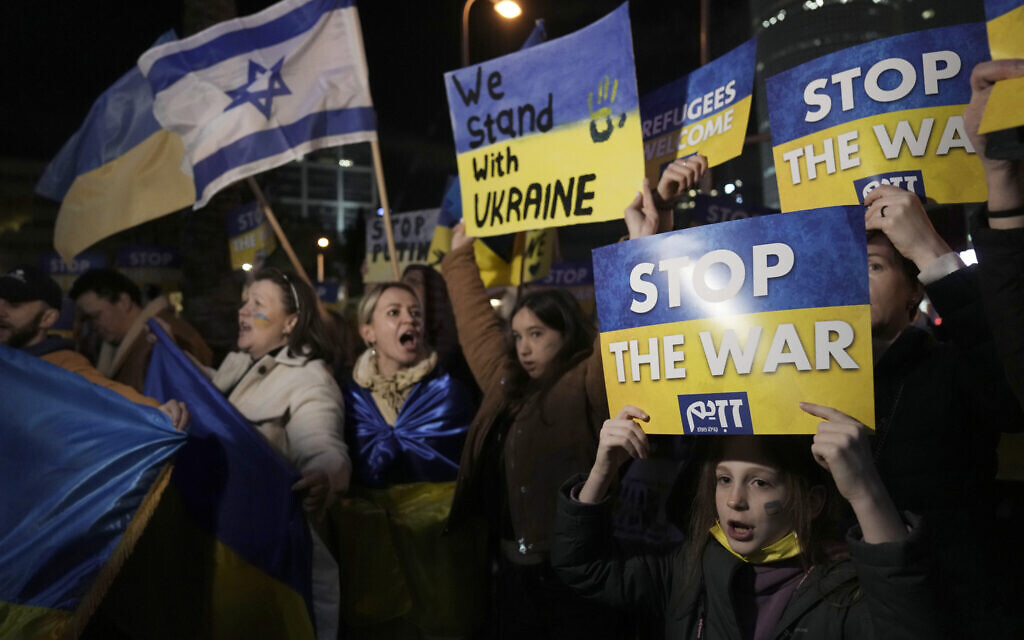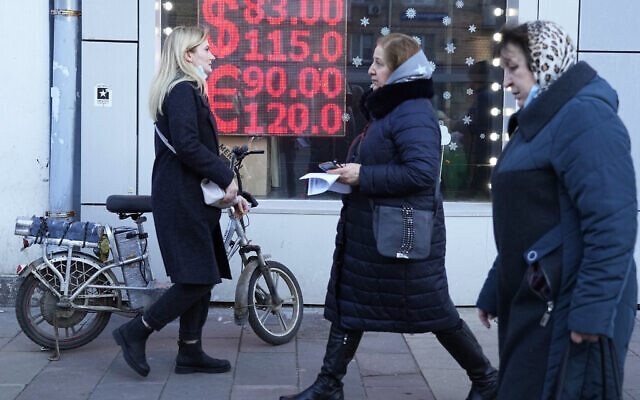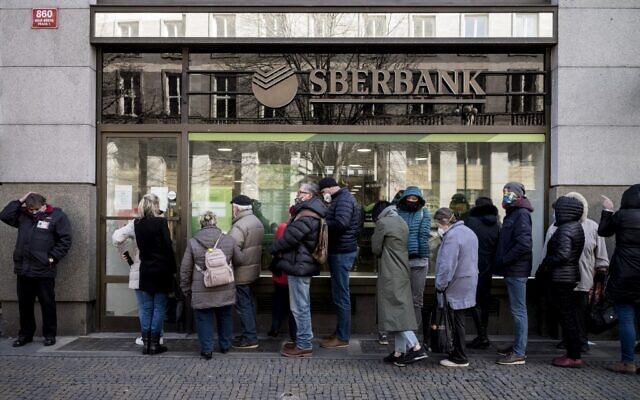Israel hasn’t joined anti-Russia sanctions, but its firms need to tread carefully
There are many pitfalls facing Israeli entities, and they’d do well to seek help in not falling afoul of myriad new measures imposed by the West over Ukraine invasion, experts say

As Israel’s politicians edge cautiously around the diplomatic fault lines of the country’s relationships with Russia and Ukraine, Israeli companies and organizations have to watch their step too, having been thrust into a labyrinth of international sanctions that put stringent curbs on their activities in Russia and with Russian entities.
In the wake of the Russian invasion of Ukraine in February, Western countries have applied crushing economic sanctions targeting Moscow’s financial institutions including its central bank, shipping and trade industry, tech and aviation sectors, and community of wealthy oligarchs and their circles.
Russia has been frozen out of international banking systems, causing the ruble to plummet in value.
And an increasing number of Western businesses have said they are halting their operations in the country. Since the invasion of Ukraine began, over 400 companies including tech firms, major manufacturers, and consumer brands said they were withdrawing from Russia, according to a tally kept by a team of researchers from Yale University. The list includes Visa, Apple, Facebook, Mastercard, Amazon, Google, Ford, Dell, DHL, and McDonald’s, as well as luxury brands like Burberry, Hermes, Ferrari, and Rolls Royce.
Israel has managed until now to walk a tightrope between Russia and Ukraine. There are Jewish communities in both nations and Russia maintains a heavy military presence in Syria, on Israel’s northern border, where the IDF needs to be able to continue its aerial sorties against Iran-backed targets. This ostensibly neutral position has enabled Israel to assume the role of mediator between the two warring parties.
Prime Minister Naftali Bennett met personally with Russian President Vladimir Putin earlier this month and has held several phone conversations with him as well as with Ukrainian President Volodymyr Zelensky.
Israel has so far desisted from joining nations including the US, Europe, the UK, Australia, and Japan in the imposition of an “unprecedented” number of sanctions on Russia, Belarus, and the two breakaway Ukrainian regions of Donetsk and Luhansk in the wake of the invasion.

Jerusalem is not currently planning to impose sanctions on Moscow or Russian oligarchs, senior Israeli officials told The Times of Israel.
But even if Israel takes no measures against Russian entities or operations, the long arm of global sanctions, especially those imposed by the US, the EU, and the UK — regions with which Israel has deep economic ties — will affect all kinds of Israeli firms, organizations, and nonprofits that have ties to Russia.
Israeli companies need to be aware of the implications of these sanctions on their activities, said experts in interviews with The Times of Israel, and should consult with legal professionals and set out compliance plans.
Violation of sanctions could lead to steep fines. It could also lead to either civil or criminal penalties, and in certain circumstances to secondary sanctions against the violator: even when there is no US jurisdiction, a foreign company that is found to provide material support to a deal can sometimes be placed under US sanctions itself.
“This is an unprecedented situation; there has never been such a wide and complex imposition of economic sanctions on such a large market other than maybe Iran,” said Naama Margolis, a partner at Shibolet & Co law firm in Tel Aviv, in a phone interview.

Companies, organizations, universities and other entities that have international ties “need to now consider what those ties mean,” she said. Specifically, they need to figure out their legal and contractual obligations to their investors, vendors, employees, and anyone who may be subject to these new regulations.
The sanctions may apply to any Israeli firm or entity that has a US subsidiary or activity in the US; a US fund as investor or US owner; or a manager who is a dual national, with both Israeli and US citizenship. The same applies for the EU, the UK, Switzerland, Japan and Australia, explained Yuval Sasson, an expert in international law and head of the practice of compliance and enforcement at Tel Aviv-based Meitar Law Offices.
“The influence is across the board, on all companies that have any international activities,” said Sasson.
Firms can best protect themselves by getting professional advice, he added.
Navigating sanctions on Russia
The Russia-related measures affect Israeli firms in three ways, he explained: directly, through the legal sanctions; indirectly, because of the halt of payments and shipping and freight services to Russia; and on a voluntary basis, with companies perceiving a reputational hazard in being associated with Russia.
A number of Israeli tech firms have already suspended or pulled their commercial operations in Russia over the ongoing war with Ukraine, including Fiverr, a company that connects businesses with freelancers offering digital services; web creator Wix; payments firm Payoneer; and gaming giant Playtika.
Israeli firms that want to trade with private or government entities in Russia and Belarus must check if the entities involved in the deal — whether a trading partner, a financial associate or even a means of transport — are on the sanctions list, the Israeli Ministry of Economy and Industry said in a March 9 letter it sent to Israeli companies.

Companies need to look at any nexus they may have with Russian entities as well as the touchpoints they have with the US, the EU, the UK, and any other country that has imposed sanctions, said Lena Zeiger, director of bilateral trade agreements department at the Foreign Trade Administration at the Ministry of Economy and Industry.
“Those companies that think there is some chance or danger of exposure… should do a deeper analysis with the assistance of lawyers,” she said. “It is really very, very complex, and each case needs to be assessed on its own.”
Those found in violation of the sanctions, she said, could face penalties or find themselves on a blacklist and barred from US or other international tenders and capital transfers. “This is a very significant risk,” she said.
The ministry has set up a dedicated online page, in Hebrew, with presentations, a webinar and English-language links to information on the sanctions to help firms navigate the new international rules.
US sanctions apply if contracts were signed physically in the US, if meetings were held in the US, or if US subsidiaries or affiliates were involved in the deal. US dollar transactions indicate a US bank involvement, as does any US person included in the deal, for example, in the role of freight forwarder or insurer. Products manufactured in the US or that have US content would also trigger US jurisdiction if any transaction with a sanctioned entity occurred, according to a presentation by US law firm Akin Gump Strauss Hauer & Feld LLP.
When assessing a deal with Russia, US sanctions may apply if there is a US person involved or the transaction occurred entirely or in part in the US. If that is the case, then the “US is going to seek jurisdiction over that transaction,” said Megan Barnhill, an attorney at the Washington DC offices of Bryan Cave Leighton Paisner (BCLP) in a March 7 webinar about the sanctions together with Tel Aviv-based firm Shibolet & Co.
A US person could be a US citizen or US permanent resident (holder of a green card), wherever they are located. So, if there is a US citizen or green card holder working for a non-US company in Israel, they would be subject to all of the prohibitions under the US sanctions, “and they have to abide by those in their individual capacity,” Barnhill explained.

Any transaction that involves a US company as a party or in any other role, or if there is a US bank anywhere in the payment chain, leaves itself open to the deal being pulled under US jurisdiction, she said.
US dollar transactions could fall under US jurisdiction too, she said, “because at some point that transaction is likely to interface with a US financial institution, as part of the clearing of the US dollar.”
If a deal has any contact with US service providers — such as customer support, invoicing or accounting — it could fall under US jurisdiction, Barnhill said. Use of a US server in a transaction could also be considered a violation of sanctions.
“There are thousands of pages of regulations that have been published, and there are a lot of different nuances, so it is important to consider where your organization may have a touchpoint or may be affected by these regulations,” said Shibolet’s Margolis.
Areas of vulnerability
Israel, with its population of just over 9 million, has a small economy, and many of its industries including its tech sector look to foreign markets for both investments and growth. This makes the country particularly vulnerable to potential backlash in the event of sanctions violations, she said.
“Many Israeli companies start out in Israel and set up affiliates abroad,” Margolis noted in the March 7 webinar. “Once a company becomes multinational, then that is an easy way to bring on foreign sanctions and export controls.”
In the process of becoming international or getting international investments, Israeli firms may have already made themselves subject to foreign jurisdictions by signing certifications or warrants to investors that state they will not break sanctions or transfer goods to a sanctioned country. They also often undertake to uphold the international foreign sanctions and export controls, and the fine print of banks they work with often says the financiers will not process transactions with entities that are under local or foreign sanctions.
Companies, organizations and regulators for the years been increasingly demanding “Know Your Customer” documentation to achieve greater transparency over the identity of investors, suppliers and customers. Thus, Israeli companies already have experience of foreign jurisdictions and sanctions in their transactions, according to Margolis. What has changed over the past few weeks, since the start of the Russian invasion, she said, is that the odds of deals actually being blocked have surged.
“In the past, the chance of being blocked on a deal on a day-to-day basis was low because Israel doesn’t usually transact with North Korea or Iran,” which has been under global sanctions for a number of years, explained Margolis. “The chances of interacting with bad actors were low.”
But now there are “quite a few ties” between Israeli companies and Russian entities, be they investors, customers, or benefactors, that need to be “reconsidered and reassessed,” she said.
Trade of goods and services
According to Central Bureau of Statistics data, the Russian Federation is not among Israel’s top 10 trading partners.
Data compiled by the Israel Export Institute shows that Israeli exports of goods and services to Russia totaled $923 million in 2021, while imports from Russia totaled $804 million.
Exports of goods include optical and electronic products, fruit and nuts, plastics, and chemicals, while imports include fuel and minerals, pearls and precious stones, steel and iron, and cereals. Services include IT and software imports and exports.

By contrast, Israeli exports of goods (not including services) to the US totaled $16.2 billion, and to China $4.3 billion.
Data compiled by IVC Research Center, which tracks the nation’s tech industry, shows that Russian investments in Israeli tech firms totaled some $46 million in 2021, with 19 investments made by four investors. In 2020, 10 Russian investors provided almost $48 million in 26 investment deals.
In 2021, Israeli tech firms raised in total a record $25.6 billion from global and local investors.
Careful considerations
Making the situation even more complicated for Israeli firms, Margolis said, the US, EU, and UK sanctions — although at times very similar — have their own nuances, exceptions, and export controls, and they came into force at different dates and don’t apply always in the same manner.
“The situation is very difficult to navigate because it is coming from so many different directions,” said Margolis. “There are so many countries that have changed their policy in a very short amount of time.”
“And so, for any company that does business internationally and has suppliers and customers and investors and different business partners in different locales, now it is not just about understanding what things have changed in one locale; you have to evaluate several legal frameworks in several countries.”
The US has a track record of being able to find touchpoints in international deals and taking action, Margolis said.
Israeli fintech firm Payoneer, for example, agreed in July to pay the US Treasury Department a fine of some $1.4 million as part of a settlement for over 2,000 sanctions violations, by processing payments for parties located in Iran, Sudan, Syria and Crimea, among others, which are subject to sanctions.
US officials will likely be subjecting Israel to added scrutiny now, Margolis said, as it is one of the few Western countries not imposing sanctions.
“There is a question of whether there will be more focus on Israel as a place where there is no local enforcement,” she said.
Because Israel has a vast number of Russian immigrants, Margolis said, commercial and personal ties to Russia are close. In addition, globalization has made it much harder to isolate economies and products from international influences.
“The world is really not set up for companies to act as an island,” said Margolis.
“Today, if you look at any product almost, it is never 100% manufactured in one country,” she noted.
The sanctions imposed on Russia will build on the already growing trend for added transparency, she said. And regulators will expect to see companies and entities setting out compliance programs and guidelines and allocating resources and teams to track customers and suppliers.
“There are so many nuances to this situation and it is also relatively unprecedented,” Margolis said.
“There has never been this kind of sanctions over such a very short amount of time by so many countries under so many different types of regulations affecting so many different kinds of businesses. So, I think the circle of businesses and people affected is really much wider than ever and I think that creates a lot of uncertainty for a lot of people,” she concluded.
There's no paywall on The Times of Israel, but the journalism we do is costly. As an independent news organization, we are in no way influenced by political or business interests. We rely on readers like you to support our fact-based coverage of Israel and the Jewish world. If you appreciate the integrity of this type of journalism, please join the ToI Community.

We’re really pleased that you’ve read X Times of Israel articles in the past month.
That’s why we started the Times of Israel eleven years ago - to provide discerning readers like you with must-read coverage of Israel and the Jewish world.
So now we have a request. Unlike other news outlets, we haven’t put up a paywall. But as the journalism we do is costly, we invite readers for whom The Times of Israel has become important to help support our work by joining The Times of Israel Community.
For as little as $6 a month you can help support our quality journalism while enjoying The Times of Israel AD-FREE, as well as accessing exclusive content available only to Times of Israel Community members.
Thank you,
David Horovitz, Founding Editor of The Times of Israel









